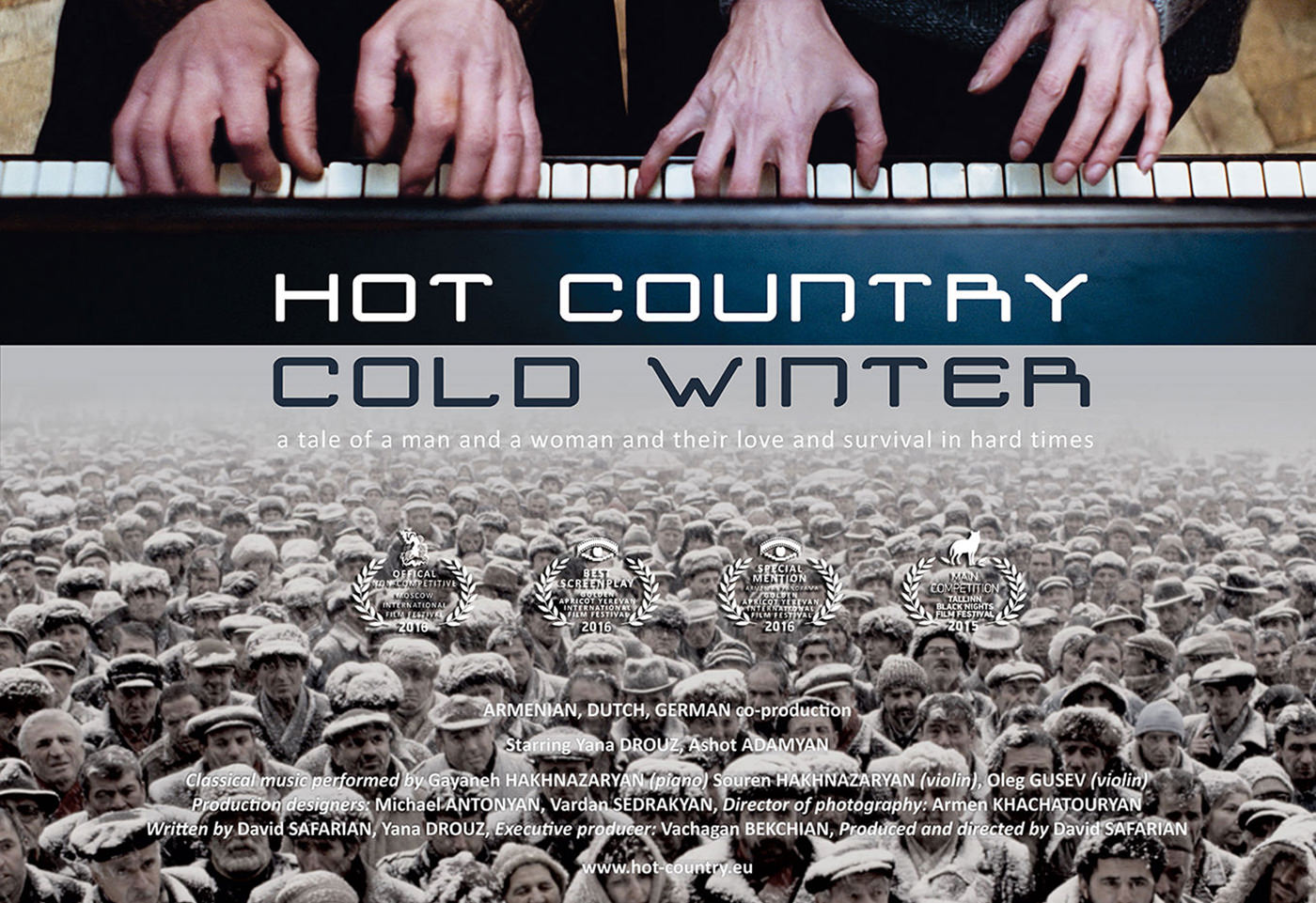A STORY ABOUT LOVE AND PERSEVERANCE: An interview with David Safarian
David Safarian is a well-known Armenian filmmaker of the 20th century and the period of centuries change. The retrospective of Safarian’s films took place at the 60th anniversary of the French Cinematheque in Paris. In 1999, his selected works were featured in Berlin. His film, LOST PARADISE, is a grandiose reflection of the personality of an Armenian individual. The film was featured at the AFI International Film Festival 24 years ago. David Safarian will return to Los Angeles this year with his new film, HOT COUNTRY, COLD WINTER (Armenian original title: Taq erkir, tsurt dzmer). The premiere gala for the feature, will take place at the Egyptian Theatre on November 4th at 7:30 p.m. HOT COUNTRY, COLD WINTER is a masterpiece about an Armenian couple’s love and steadfastness in trying times.
– Mr. Safarian, you have waited around 25 years to unveil your second film. How do you feel now when the work is complete?
25 years? They have passed in a heartbeat. On the other hand, so much has happened and changed in that time. I have worked on other projects, as it is with the documentary series about Armenian history and culture for German television, or my fine art exhibitions. However I have not waited. All these years, I have diligently worked on the film even when I was busy with other things. Without exception, there has not been a day where I have not worked on this project at least for a few hours. Let us not talk of this anymore… It is like a musician who plays his instrument every day. Perhaps, that is the secret the musician and his music speak directly to your soul. All other arts just hope one day to have the same effect as the music do. If my film really touches the souls of its viewers, then this is a proof that the endless hours of work were not wasted.
Yes, HOT COUNTRY, COLD WINTER is at the first about the life in hard times. Today for many, it is difficult to comprehend the inhumane circumstances our people lived through. As a race, we persevered and found ways to rise and continue living. The main character in the movie, Tigran, states, “when the living conditions become unbearable, people quickly lose their human face. For years we live in insufferable conditions, and thank God, we stayed human.” This theme is true not only to Armenians but to all people, all around the world.
How do I feel now that the film is complete? After the film’s sound mixing was finalized, I woke up in the morning wanting to go to the studio and realized there was nothing left for me to do. I have lived “with” this movie for years and now I am left all alone. It feels as though, my wife of many years has left me – even though I have never experienced that. Are there any other questions left after this answer?
– There are even more. Is art your hobby?
No, it is not a hobby. I was asked this question before, and my answer was, “Fine art is my primary language, cinematography is the studied one.” However, I have studied well and have mastered that language of making films. Look, English will always be the primary language of a German speaking Englishman, although his German is perfect. I was born into an artistic family and grew up in my father’s studio. I have always been surrounded by artists. My grandfather, Sarkis Safarian, was the art director of the first Armenian sound movie and one of the creators of ‘Armenfilm’ Studios. My father, Souren Safarian, was a famous artist. My nephew, Souren Safarian the Minor, is an outstanding Armenian contemporary artist, whose work is showcased in Italy, France, Germany, Australia. His son, Armen, also draws. We are now preparing for a show called ‘5 Generations’, an exhibition in China.
– Mr. Safarian, it seems your work will be showcased there as well.
Yes, however I believe we have strayed from the topic.
– This is your life… Let us return to the topic of film. LOST PARADISE your first movie, a true example of an Armenian family. The story takes place in a suburb at the foothills of a mountain facing Biblical Ararat. The film is recognized for the powerful effect it had on its viewers. What inspirational circumstances have you come across since the making of this film?
First and foremost, this movie has a strong reflection of classic fine art. Then, of course, my collaborative work with my director of photography Ashot Mkrtichyan. Definitely, the discussions with the wise elderly man Gevorg Thovmassian who was acting the main character. He too had lived through the same circumstances described in the film, and was one who experienced the massacre in Turkey. The entire story of the movie is set in the 1980’s. There is no one single footage concerning the genocide itself, but world renown, Jean Rouch, the founder of French Cinema Verite and the President of Cinematheque Francaise said the following about the film, “LOST PARADISE, is the strongest reflection of the Armenian Genocide in film art, even though I know and appreciate Malyan’s NAHAPET and Verneuil’s MAYRIG. I congratulate you David.” Those words are recorded and could be found in the Library of Cinematheque Francaise. This statement is the highest appreciation of my work. And the premier of LOST PARADISE in Los Angeles is unforgettable. The film was featured at Monica Theatre and many articles were published in Variety, Hollywood Reporter, LA Reader and other newspapers. I think, your city is the most influential place of my career, and my movies. Now, just imagine what means for me this year US Premiere of HOT COUNTRY, COLD WINTER in Los Angeles at the Arpa International Film Festival.
– HOT COUNTRY, COLD WINTER is a movie about love and an unfaltering Armenian family. What inspired you to create this film?
Personal experience! Also the people who helped make this film a reality. Yana Drouz, Ashot Adamyan, Armen Khachatryan, Ashot Mkrtichyan, Vardan Sedrakyan, Mikayel Antonyan, Gayaneh Hakhnazaryan, Souren Hakhnazaryan, Oleg Gousev, Aleksey Yourovski, Anna Drozhenko, Levon Karapetyan, Hmayak Rosdomyan, Asatur Demirjian… Stop me, otherwise I’m going to enumerate all of my collaborators. They are more than 80, and I will never forget one single name.
– Bravo! Bravo! In your opinion, what are the most recognized and original symbols in the Armenian culture? If you could clarify the effect your homeland has had on you and what has impacted the making of your films?
Give me a moment to count how many questions you asked. I counted. Let me try to answer your questions. I do not believe a symbol could be original and well known simultaneously. In my and not only my opinion, Mount Ararat is the most recognized and the most common Armenian symbol. Mount Ararat is in Turkey. The original symbol..? For me it is an empty Yerevan in 1973 at the ‘Ararat’ soccer game, and then… the 100.000 people coming out of the ‘Hrazdan’ stadium and again making the city alive. But look. We do not have our Mount Ararat, today we do not have that 100.000 crowd coming out of the stadium and we do not have our champion team ‘Ararat’. However, all this lives in all of us, in our souls. Nobody is able to take that away from us. This is our power. In LOST PARADISE the old man Mkhitar says, “My grandson can miss what he has not seen.” We know the feeling of missing what we had never seen. We know how to remember what we have seen and lost. This has had its effect on me and my movies. And I should say about the light which in the mornings flows down from the peak of Ararat then floods my city. I have this image in HOT COUNTRY, COLD WINTER. This light also has its effect on me and my movies. Maybe, that’s why this film even with many scenes in darkness is consequently full of light. This is not only my opinion.

– Will you attend the premiere of HOT COUNTRY, COLD WINTER in Los Angeles? Could you tell us how you feel about returning after 25 years? What impression do you have of Los Angeles?
I am excited and very happy that I will be seeing friends whom I have not seen in years. My image of Los Angeles has something to do with light as well. It was June 1992, my first night in Los Angeles, and I was shown the city lights. They thought I would be impressed. I told them, “it is beautiful but a night in Yerevan is no different.” One of the natives said, “It is impossible.” When I was back, Yerevan was no more illuminated as before. This determined the topic of my film. Today my city is again full of light. We’ll see, this time, it could be I agree with the natives that Los Angeles is the most illuminated city in the World.
– Your film, HOT COUNTRY, COLD WINTER, is being regarded as a classic and original piece alongside Ingmar Bergman’s, Federico Fellini’s, Andrey Tarkovski’s films. When and how did you fall in love with film?
This sounds as an extraordinary compliment. In any case, I am humbled by this recognition. Those were key points, legends I have looked up to. I will name a few more who have played a vital role in maturing of my cinematographic taste and style: Luis Bunuel, Satyajit Ray, Akira Kurosawa. The French Nouvelle Vague. Artavazd Peleshyan. And two more, maybe the most important for me names: Buster Keaton and Charles Chaplin. I have probably learned from them the most and continue to learn. And it seems, finally I’ll allow myself to make a comedy.
You asked when I fell in love with film. I was 4 years old when the first time my grandfather, Sarkis, took me to the film studio. I remember that day clearly. We can count this as the start. At 11 years old, I told my father I wanted to be a filmmaker. At 14, I started reading Lev Kuleshov’s ‘The ABC of filmmaking’ and Georges Sadoul’s ‘The General History of Cinema’. You can’t imagine, I just now thought about my love affairs: I was 4 years old when I first fell in love, the second time I was 11, and the third time 14. Funny! It’ a good final for the interview, I think. Let’s finish.
– Let’s finish. Thank-you for allowing me to interview you and for your humor. And we will be waiting for your comedy movie.
Remember that over 20 years are passing in an instant. Kidding, this time it is to wait no more than for two years. After all, I will not have that much time. I am not going to live until I’m 200.
– May you live a long life and complete all of your new ideas.
Yes, I give you my word.
Interview by Gregor Zupanc, Artistic Director at the 19th Arpa International Film Festival
